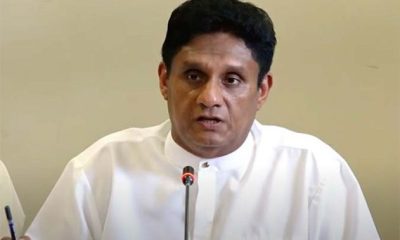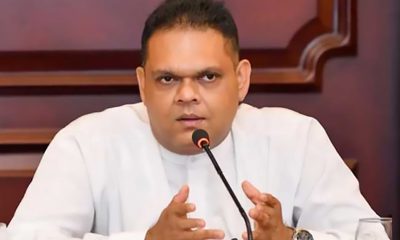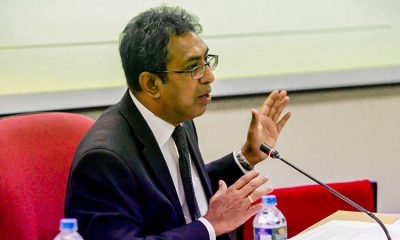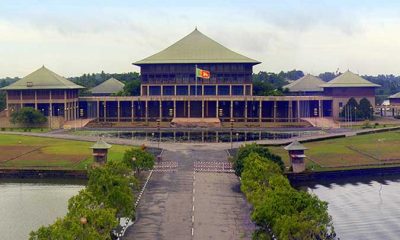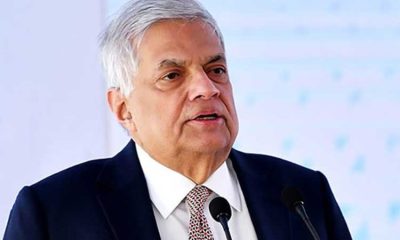Features
Full implementation of 13A: Final solution to ‘national problem’ or end of unitary state? – Part VIII
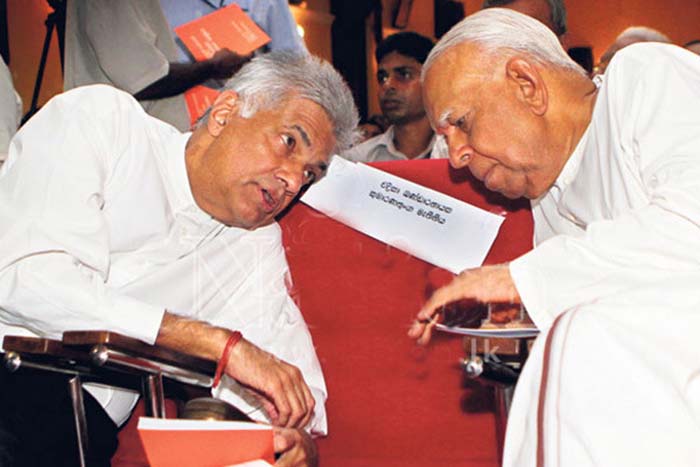
by Kalyananda Tiranagama
Executive Director
Lawyers for Human Rights and Development
(Part VII of this article appeared on 04 Oct., 2023)
President Ranil Wickremesinghe has not been able to point out any benefit received by the people or any development activity carried out by any of the Provincial Councils for the welfare of the people in their provinces. This is what the President says in this connection:
‘‘Some individuals in our nation label provincial councils as ‘‘white elephants’’ due to these challenges. Yet, amid these limitations, provincial councils have significantly influenced Sri Lanka’s political trajectory. They have nurtured skilled political leaders and served as stepping stones to executive and parliamentary roles. Throughout history, numerous individuals who have embarked on their political journey as provincial council members have ascended to positions of power like executive presidency, premiership, cabinet membership, and other significant roles.’’
Other than nurturing and enriching some local politicians and their families and serving as stepping stones for them to enter national politics, what have the provincial councils done for the benefit of the people in their areas, to improve their living conditions, to address their grievances or to find solutions to their problems? Nothing.
Who are the skilled political leaders nurtured by Provincial Councils? What have they done for the people or the country with their skills and experience gathered at the provincial councils, other than wasting public funds and public property and enriching themselves through various deals? Perhaps, the President may not be able to answer these queries.
Other than from the politicians, there is no demand whatsoever from the people of any Provincial Council area for conducting Provincial Council elections though more than six years have elapsed since their dissolution by law. That is the best proof that the Provincial Councils have not served any useful purpose beneficial to the people in their views.
The Report of the Sub-committee on Centre – Periphery Relations recommends: (a) to do away with the Concurrent List and add the subjects to relevant Lists; (b) to repeal the rubric ‘National Policy on all Subjects and Functions from the Reserved List. (3) All Subjects and Functions not specified in any of the lists (provincial and reserved lists) should be the subject matter of the province;
This Report further states that ‘‘most of the subjects in the Concurrent List are legitimate functions to be in the ‘Provincial List. The existence of Centre Ministries such as Ministry of Rehabilitation, Social Services, Social Welfare, Women and Children, Indigenous Medicine, Disaster Relief and Agriculture has no justification, except under the wrap of Concurrent List and National Policy.
Law and Order and Police Powers: (a) Law and Order has to be the subject matter of the province. (b) Administration of Police should be through an Independent Provincial Police Commission (PPC) as in the Centre. The PPC could work in close collaboration with the National Police Commission on administrative matters. (c) The National Police can handle organized crimes, narcotics, terrorism etc.
The Sub-Committee’s Recommendation on Land Powers: (a) State land within a province should be the subject matter to be handled by the Province; (b) The State Land Commission should consist of equitable number of members representing the interests of the Centre as well as the provinces; (c) No decision of such institution can be imposed on any province without the consent of the representative of such Province.
As to how to give effect to these recommendations, the President has come out with his response in his Address to Parliament thus:
‘‘ I propose introducing several Bills to the Parliament and implementing series of new measures: a. Appointment of Divisional Secretaries.
b. Granting Authority to Provincial Councils for Education-related Services; This involves exercising all powers related to school education listed in Schedule 3 of the Provincial Councils List.
c. Establishment of Provincial Boards for Vocational and Technical Training Services;
d. Empowerment of Provincial Councils to Establish Universities
e. Authorization for Provincial Councils to Provide for Agricultural Innovation and Services.
f. Creation of Provincial Tourism Promotion Boards.
g. Amendment to the Industries Act to increase the limit for industries of national importance, the limit will be raised from Rs. 4 million to Rs. 250 million. If Parliament agrees, ready to elevate it to Rs. 500 million.
h. Establishment of District Development Councils: Develop a three-year Development Plan for each Provincial Council in alignment with Central Govt national policies. Integrate central govt development programs into this plan, customized to each jurisdiction. Execute this three-year plan via District Development Councils and entrust its implementation to Provincial Councils.
Formulate a legal framework wherein MPs, Members of PCs and local govt bodies representing each district can collaborate effectively in this endeavour.
There can be no doubt that the President is planning to give effect to the proposals in the Report of the Sub-committee on Centre – Periphery Relations through this process.
In this speech he has taken care not to mention anything about the Northern and Eastern Provinces or the Tamil national question, so as not to unnecessarily stir up hornets’ nests.
While introducing Bills in Parliament dealing with different subjects where necessary, he may deal with most of the matters through administrative measures using his Executive Power as the President as he has already done in the case of state lands coming under the Departments of Archaeology, Forest and Wild Life.
Though there is no transfer of decentralized powers to the Central Government with the participation of provincial councils in the formulation of national policies on matters within the Provincial List as stated by him, it will certainly result in transferring powers of the Central Government to the provincial councils not only on matters within the Provincial List, but also on matters in the National List.
When this process is completed, Provincial Councils will become fully autonomous bodies effectively exercising all the powers of the Government other than the powers mentioned in the Reserved List exercised by the Central Government.
That is the common dream of Mr. R. Sampanthan shared with the President.
From the speech of the President, one can get an idea about the strategy the President is going to adopt to ensure that he can muster the support of the majority of MPs in Parliament. He proposes to do things, which will, most probably, enable him to muster not only simple majority, but also two thirds majority in Parliament required for bringing about amendments to the Constitution, if the need arises. These are his proposals:
An advisory council to guide the Governors – consisting of Chairman of the Provincial Supervisory Committee, Chairman of the District Development Committee and MPs representing political parties within the Province.
Currently, there are 45 functioning Ministries in the Provincial Councils. Oversight committees can be established for these Ministries with parliamentarians who have no other responsibilities being appointed as their heads.
Let us see how the President’s strategy works to muster the majority support required to bring about revision of laws, including constitutional amendments:
In the present Govt there are 22 Cabinet Ministers and 38 State Ministers.
There will be 25 District Development Councils for the 25 Districts in the country. The Chairman of each District Development Committee will invariably be a Member of Parliament representing the District. These 25 Chairmen of District Development Committees will be entitled to additional perks as those of State Ministers. That was the practice in the District Development Committees functioned in President Jayewardene’s time.
In addition, they will be members of the Advisory Council set up to guide the Governors. All the MPs representing political parties within the Province will also be members of the Advisory Council.
45 Oversight committees will be established for the 45 Provincial Council Ministries with 45 parliamentarians who have no other responsibilities being appointed as their heads. They will be entitled to additional perks as the Heads of the Oversight Committees. This offer of the opportunity of being appointed as the Heads of the Oversight Committees will certainly lure more and more MPs to support these moves.
Moreover, as the real motive of bringing these reforms is hidden and undisclosed, the Chief Ministers and Members of the Provincial Councils in the other seven Provinces will undoubtedly bring pressure on their parties to support these moves. The President is well aware of this.
Following the revision of these laws concerning PCs and enactment of new laws, PC Elections Act to be amended.
Then the Northern and Eastern Provinces will be merged through a resolution passed by Parliament to that effect, the Provincial Council Elections will be held, and the North – East Provincial Council can start its march towards its final goal of establishing the State of Tamil Eelam with international support.
Unless the people see through this diabolical scheme and rise up openly against it compelling their political leaders and MPs to come forward to defeat it, that will open the gates for the ending of Sri Lanka as a unitary state.
Inevitable Outcome of Granting 13+ – Establishment of Separate State of Tamil Ealam with International Support
President Wickremesinghe talks of finding a final solution to the Tamil People’s problem acceptable to them, of providing a solution to the Tamil national problem satisfactory to the Tamil People, and addressing the grievances of the People in the North and the East for meaningful devolution of power. If President Wickremesinghe honestly thinks that he can bring about national unity, national reconciliation among Sinhala and Tamil communities by acceding to the demands of Tamil political parties, he must be living in a fool’s paradise.
It is common knowledge that the majority of Tamil people in Sri Lanka live not in the Northern and the Eastern Provinces, but in the other seven Provinces. Outside the North and the East, thousands of Tamil People live with the Sinhala People with amity and friendship, working in cooperation and understanding. There is no discord or racial clashes among them.
Thousands of Sinhala people visit Hindu Kovils during the Vel festival. They gather on road sides making offerings to Vel Perahera. During the Kataragama festival season thousands of Tamil Hindu pilgrims engage in their annual walk from the North to Kataragama across Sinhala areas. They are well received and treated by Sinhala People.
Hundreds of Sinhala Buddhist pilgrims visit Nagadeepa Temple. They well received by Tamil People. There is no discrimination. The main problem is lack of proper communication due to language barriers. If this barrier is overcome, it will not be difficult to bring about real national unity, harmony and national reconciliation among the Sinhala and Tamil People.
In this connection, I can cite my own experience of an effort that I made to bring this issue to the attention of Authorities as I think it is relevant. In 2003 and 2004, I conducted four orientation programmes for the Army and Police officers in Jaffna and Kankesanthurai Divisions on human rights and international humanitarian law at the request of UNHCR.
Dr. Laksiri Fernando of Colombo University, S. G. Puchihewa and Nimal Punchihewa, former President of the Elections Commission, participated with me in conducting these programs. We were staying in Jaffna Social Centre and they had got down three young girls to prepare food for us. I talked to them and they told us that they were jobless graduates from Sabaragamuwa University, as they had no jobs they were engaging in that type of work and that there were many others like them.
(To be concluded)
Features
The heart-friendly health minister

by Dr Gotabhya Ranasinghe
Senior Consultant Cardiologist
National Hospital Sri Lanka
When we sought a meeting with Hon Dr. Ramesh Pathirana, Minister of Health, he graciously cleared his busy schedule to accommodate us. Renowned for his attentive listening and deep understanding, Minister Pathirana is dedicated to advancing the health sector. His openness and transparency exemplify the qualities of an exemplary politician and minister.
Dr. Palitha Mahipala, the current Health Secretary, demonstrates both commendable enthusiasm and unwavering support. This combination of attributes makes him a highly compatible colleague for the esteemed Minister of Health.
Our discussion centered on a project that has been in the works for the past 30 years, one that no other minister had managed to advance.
Minister Pathirana, however, recognized the project’s significance and its potential to revolutionize care for heart patients.
The project involves the construction of a state-of-the-art facility at the premises of the National Hospital Colombo. The project’s location within the premises of the National Hospital underscores its importance and relevance to the healthcare infrastructure of the nation.
This facility will include a cardiology building and a tertiary care center, equipped with the latest technology to handle and treat all types of heart-related conditions and surgeries.
Securing funding was a major milestone for this initiative. Minister Pathirana successfully obtained approval for a $40 billion loan from the Asian Development Bank. With the funding in place, the foundation stone is scheduled to be laid in September this year, and construction will begin in January 2025.
This project guarantees a consistent and uninterrupted supply of stents and related medications for heart patients. As a result, patients will have timely access to essential medical supplies during their treatment and recovery. By securing these critical resources, the project aims to enhance patient outcomes, minimize treatment delays, and maintain the highest standards of cardiac care.
Upon its fruition, this monumental building will serve as a beacon of hope and healing, symbolizing the unwavering dedication to improving patient outcomes and fostering a healthier society.We anticipate a future marked by significant progress and positive outcomes in Sri Lanka’s cardiovascular treatment landscape within the foreseeable timeframe.
Features
A LOVING TRIBUTE TO JESUIT FR. ALOYSIUS PIERIS ON HIS 90th BIRTHDAY

by Fr. Emmanuel Fernando, OMI
Jesuit Fr. Aloysius Pieris (affectionately called Fr. Aloy) celebrated his 90th birthday on April 9, 2024 and I, as the editor of our Oblate Journal, THE MISSIONARY OBLATE had gone to press by that time. Immediately I decided to publish an article, appreciating the untiring selfless services he continues to offer for inter-Faith dialogue, the renewal of the Catholic Church, his concern for the poor and the suffering Sri Lankan masses and to me, the present writer.
It was in 1988, when I was appointed Director of the Oblate Scholastics at Ampitiya by the then Oblate Provincial Fr. Anselm Silva, that I came to know Fr. Aloy more closely. Knowing well his expertise in matters spiritual, theological, Indological and pastoral, and with the collaborative spirit of my companion-formators, our Oblate Scholastics were sent to Tulana, the Research and Encounter Centre, Kelaniya, of which he is the Founder-Director, for ‘exposure-programmes’ on matters spiritual, biblical, theological and pastoral. Some of these dimensions according to my view and that of my companion-formators, were not available at the National Seminary, Ampitiya.
Ever since that time, our Oblate formators/ accompaniers at the Oblate Scholasticate, Ampitiya , have continued to send our Oblate Scholastics to Tulana Centre for deepening their insights and convictions regarding matters needed to serve the people in today’s context. Fr. Aloy also had tried very enthusiastically with the Oblate team headed by Frs. Oswald Firth and Clement Waidyasekara to begin a Theologate, directed by the Religious Congregations in Sri Lanka, for the contextual formation/ accompaniment of their members. It should very well be a desired goal of the Leaders / Provincials of the Religious Congregations.
Besides being a formator/accompanier at the Oblate Scholasticate, I was entrusted also with the task of editing and publishing our Oblate journal, ‘The Missionary Oblate’. To maintain the quality of the journal I continue to depend on Fr. Aloy for his thought-provoking and stimulating articles on Biblical Spirituality, Biblical Theology and Ecclesiology. I am very grateful to him for his generous assistance. Of late, his writings on renewal of the Church, initiated by Pope St. John XX111 and continued by Pope Francis through the Synodal path, published in our Oblate journal, enable our readers to focus their attention also on the needed renewal in the Catholic Church in Sri Lanka. Fr. Aloy appreciated very much the Synodal path adopted by the Jesuit Pope Francis for the renewal of the Church, rooted very much on prayerful discernment. In my Religious and presbyteral life, Fr.Aloy continues to be my spiritual animator / guide and ongoing formator / acccompanier.
Fr. Aloysius Pieris, BA Hons (Lond), LPh (SHC, India), STL (PFT, Naples), PhD (SLU/VC), ThD (Tilburg), D.Ltt (KU), has been one of the eminent Asian theologians well recognized internationally and one who has lectured and held visiting chairs in many universities both in the West and in the East. Many members of Religious Congregations from Asian countries have benefited from his lectures and guidance in the East Asian Pastoral Institute (EAPI) in Manila, Philippines. He had been a Theologian consulted by the Federation of Asian Bishops’ Conferences for many years. During his professorship at the Gregorian University in Rome, he was called to be a member of a special group of advisers on other religions consulted by Pope Paul VI.
Fr. Aloy is the author of more than 30 books and well over 500 Research Papers. Some of his books and articles have been translated and published in several countries. Among those books, one can find the following: 1) The Genesis of an Asian Theology of Liberation (An Autobiographical Excursus on the Art of Theologising in Asia, 2) An Asian Theology of Liberation, 3) Providential Timeliness of Vatican 11 (a long-overdue halt to a scandalous millennium, 4) Give Vatican 11 a chance, 5) Leadership in the Church, 6) Relishing our faith in working for justice (Themes for study and discussion), 7) A Message meant mainly, not exclusively for Jesuits (Background information necessary for helping Francis renew the Church), 8) Lent in Lanka (Reflections and Resolutions, 9) Love meets wisdom (A Christian Experience of Buddhism, 10) Fire and Water 11) God’s Reign for God’s poor, 12) Our Unhiddden Agenda (How we Jesuits work, pray and form our men). He is also the Editor of two journals, Vagdevi, Journal of Religious Reflection and Dialogue, New Series.
Fr. Aloy has a BA in Pali and Sanskrit from the University of London and a Ph.D in Buddhist Philosophy from the University of Sri Lankan, Vidyodaya Campus. On Nov. 23, 2019, he was awarded the prestigious honorary Doctorate of Literature (D.Litt) by the Chancellor of the University of Kelaniya, the Most Venerable Welamitiyawe Dharmakirthi Sri Kusala Dhamma Thera.
Fr. Aloy continues to be a promoter of Gospel values and virtues. Justice as a constitutive dimension of love and social concern for the downtrodden masses are very much noted in his life and work. He had very much appreciated the commitment of the late Fr. Joseph (Joe) Fernando, the National Director of the Social and Economic Centre (SEDEC) for the poor.
In Sri Lanka, a few religious Congregations – the Good Shepherd Sisters, the Christian Brothers, the Marist Brothers and the Oblates – have invited him to animate their members especially during their Provincial Congresses, Chapters and International Conferences. The mainline Christian Churches also have sought his advice and followed his seminars. I, for one, regret very much, that the Sri Lankan authorities of the Catholic Church –today’s Hierarchy—- have not sought Fr.
Aloy’s expertise for the renewal of the Catholic Church in Sri Lanka and thus have not benefited from the immense store of wisdom and insight that he can offer to our local Church while the Sri Lankan bishops who governed the Catholic church in the immediate aftermath of the Second Vatican Council (Edmund Fernando OMI, Anthony de Saram, Leo Nanayakkara OSB, Frank Marcus Fernando, Paul Perera,) visited him and consulted him on many matters. Among the Tamil Bishops, Bishop Rayappu Joseph was keeping close contact with him and Bishop J. Deogupillai hosted him and his team visiting him after the horrible Black July massacre of Tamils.
Features
A fairy tale, success or debacle

Sri Lanka-Singapore Free Trade Agreement
By Gomi Senadhira
senadhiragomi@gmail.com
“You might tell fairy tales, but the progress of a country cannot be achieved through such narratives. A country cannot be developed by making false promises. The country moved backward because of the electoral promises made by political parties throughout time. We have witnessed that the ultimate result of this is the country becoming bankrupt. Unfortunately, many segments of the population have not come to realize this yet.” – President Ranil Wickremesinghe, 2024 Budget speech
Any Sri Lankan would agree with the above words of President Wickremesinghe on the false promises our politicians and officials make and the fairy tales they narrate which bankrupted this country. So, to understand this, let’s look at one such fairy tale with lots of false promises; Ranil Wickremesinghe’s greatest achievement in the area of international trade and investment promotion during the Yahapalana period, Sri Lanka-Singapore Free Trade Agreement (SLSFTA).
It is appropriate and timely to do it now as Finance Minister Wickremesinghe has just presented to parliament a bill on the National Policy on Economic Transformation which includes the establishment of an Office for International Trade and the Sri Lanka Institute of Economics and International Trade.
Was SLSFTA a “Cleverly negotiated Free Trade Agreement” as stated by the (former) Minister of Development Strategies and International Trade Malik Samarawickrama during the Parliamentary Debate on the SLSFTA in July 2018, or a colossal blunder covered up with lies, false promises, and fairy tales? After SLSFTA was signed there were a number of fairy tales published on this agreement by the Ministry of Development Strategies and International, Institute of Policy Studies, and others.
However, for this article, I would like to limit my comments to the speech by Minister Samarawickrama during the Parliamentary Debate, and the two most important areas in the agreement which were covered up with lies, fairy tales, and false promises, namely: revenue loss for Sri Lanka and Investment from Singapore. On the other important area, “Waste products dumping” I do not want to comment here as I have written extensively on the issue.
1. The revenue loss
During the Parliamentary Debate in July 2018, Minister Samarawickrama stated “…. let me reiterate that this FTA with Singapore has been very cleverly negotiated by us…. The liberalisation programme under this FTA has been carefully designed to have the least impact on domestic industry and revenue collection. We have included all revenue sensitive items in the negative list of items which will not be subject to removal of tariff. Therefore, 97.8% revenue from Customs duty is protected. Our tariff liberalisation will take place over a period of 12-15 years! In fact, the revenue earned through tariffs on goods imported from Singapore last year was Rs. 35 billion.
The revenue loss for over the next 15 years due to the FTA is only Rs. 733 million– which when annualised, on average, is just Rs. 51 million. That is just 0.14% per year! So anyone who claims the Singapore FTA causes revenue loss to the Government cannot do basic arithmetic! Mr. Speaker, in conclusion, I call on my fellow members of this House – don’t mislead the public with baseless criticism that is not grounded in facts. Don’t look at petty politics and use these issues for your own political survival.”
I was surprised to read the minister’s speech because an article published in January 2018 in “The Straits Times“, based on information released by the Singaporean Negotiators stated, “…. With the FTA, tariff savings for Singapore exports are estimated to hit $10 million annually“.
As the annual tariff savings (that is the revenue loss for Sri Lanka) calculated by the Singaporean Negotiators, Singaporean $ 10 million (Sri Lankan rupees 1,200 million in 2018) was way above the rupees’ 733 million revenue loss for 15 years estimated by the Sri Lankan negotiators, it was clear to any observer that one of the parties to the agreement had not done the basic arithmetic!
Six years later, according to a report published by “The Morning” newspaper, speaking at the Committee on Public Finance (COPF) on 7th May 2024, Mr Samarawickrama’s chief trade negotiator K.J. Weerasinghehad had admitted “…. that forecasted revenue loss for the Government of Sri Lanka through the Singapore FTA is Rs. 450 million in 2023 and Rs. 1.3 billion in 2024.”
If these numbers are correct, as tariff liberalisation under the SLSFTA has just started, we will pass Rs 2 billion very soon. Then, the question is how Sri Lanka’s trade negotiators made such a colossal blunder. Didn’t they do their basic arithmetic? If they didn’t know how to do basic arithmetic they should have at least done their basic readings. For example, the headline of the article published in The Straits Times in January 2018 was “Singapore, Sri Lanka sign FTA, annual savings of $10m expected”.
Anyway, as Sri Lanka’s chief negotiator reiterated at the COPF meeting that “…. since 99% of the tariffs in Singapore have zero rates of duty, Sri Lanka has agreed on 80% tariff liberalisation over a period of 15 years while expecting Singapore investments to address the imbalance in trade,” let’s turn towards investment.
Investment from Singapore
In July 2018, speaking during the Parliamentary Debate on the FTA this is what Minister Malik Samarawickrama stated on investment from Singapore, “Already, thanks to this FTA, in just the past two-and-a-half months since the agreement came into effect we have received a proposal from Singapore for investment amounting to $ 14.8 billion in an oil refinery for export of petroleum products. In addition, we have proposals for a steel manufacturing plant for exports ($ 1 billion investment), flour milling plant ($ 50 million), sugar refinery ($ 200 million). This adds up to more than $ 16.05 billion in the pipeline on these projects alone.
And all of these projects will create thousands of more jobs for our people. In principle approval has already been granted by the BOI and the investors are awaiting the release of land the environmental approvals to commence the project.
I request the Opposition and those with vested interests to change their narrow-minded thinking and join us to develop our country. We must always look at what is best for the whole community, not just the few who may oppose. We owe it to our people to courageously take decisions that will change their lives for the better.”
According to the media report I quoted earlier, speaking at the Committee on Public Finance (COPF) Chief Negotiator Weerasinghe has admitted that Sri Lanka was not happy with overall Singapore investments that have come in the past few years in return for the trade liberalisation under the Singapore-Sri Lanka Free Trade Agreement. He has added that between 2021 and 2023 the total investment from Singapore had been around $162 million!
What happened to those projects worth $16 billion negotiated, thanks to the SLSFTA, in just the two-and-a-half months after the agreement came into effect and approved by the BOI? I do not know about the steel manufacturing plant for exports ($ 1 billion investment), flour milling plant ($ 50 million) and sugar refinery ($ 200 million).
However, story of the multibillion-dollar investment in the Petroleum Refinery unfolded in a manner that would qualify it as the best fairy tale with false promises presented by our politicians and the officials, prior to 2019 elections.
Though many Sri Lankans got to know, through the media which repeatedly highlighted a plethora of issues surrounding the project and the questionable credentials of the Singaporean investor, the construction work on the Mirrijiwela Oil Refinery along with the cement factory began on the24th of March 2019 with a bang and Minister Ranil Wickremesinghe and his ministers along with the foreign and local dignitaries laid the foundation stones.
That was few months before the 2019 Presidential elections. Inaugurating the construction work Prime Minister Ranil Wickremesinghe said the projects will create thousands of job opportunities in the area and surrounding districts.
The oil refinery, which was to be built over 200 acres of land, with the capacity to refine 200,000 barrels of crude oil per day, was to generate US$7 billion of exports and create 1,500 direct and 3,000 indirect jobs. The construction of the refinery was to be completed in 44 months. Four years later, in August 2023 the Cabinet of Ministers approved the proposal presented by President Ranil Wickremesinghe to cancel the agreement with the investors of the refinery as the project has not been implemented! Can they explain to the country how much money was wasted to produce that fairy tale?
It is obvious that the President, ministers, and officials had made huge blunders and had deliberately misled the public and the parliament on the revenue loss and potential investment from SLSFTA with fairy tales and false promises.
As the president himself said, a country cannot be developed by making false promises or with fairy tales and these false promises and fairy tales had bankrupted the country. “Unfortunately, many segments of the population have not come to realize this yet”.
(The writer, a specialist and an activist on trade and development issues . )


